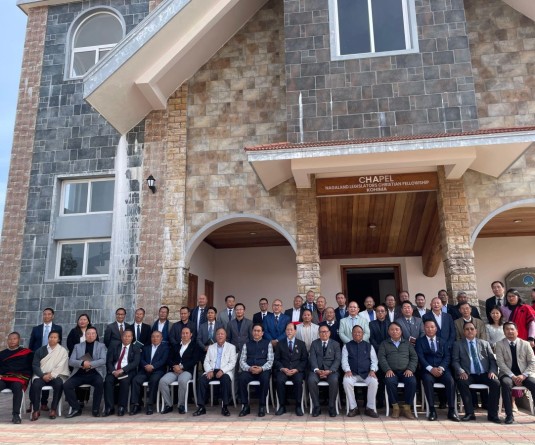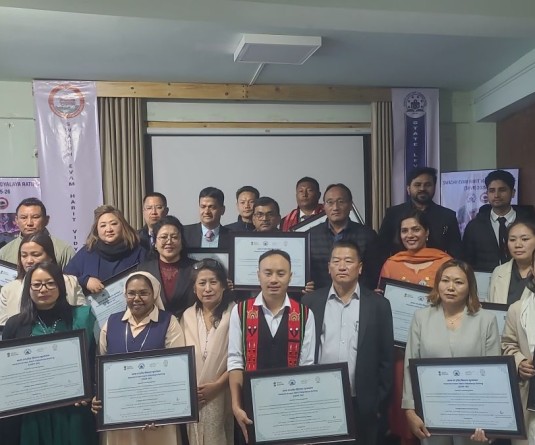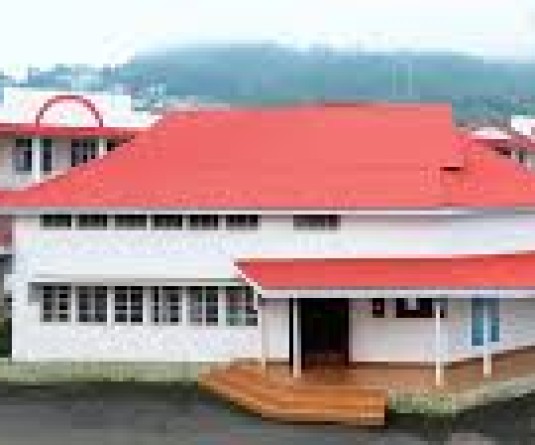NU Pro Vice Chancellor GT Thong speaking during the conference.

NU Pro VC calls for enhancing investment in Higher Education
Morung Express News
Dimapur | November 10
Government-run colleges in Nagaland are said to have made good progress despite the numerous problems plaguing the state, according to the Pro Vice Chancellor of the Nagaland University, GT Thong.
However, he said that the requirements set by the National Education Policy (NEP)-2020 demands enhancing funding towards the higher education sector and thereby improving infrastructure and fixing teacher shortage.
“The state government must enhance the budget of the (Higher Education) Department, which will help in recruiting more teachers and enhance classroom space in the existing colleges,” said Prof Thong. He made the remark at the Triennial Conference-cum-National Seminar organised by the All Nagaland Government College Teachers’ Association (ANGCTA) on November 10. The event 2-day event, which started on November 9, was organised in collaboration with the Dimapur Government College Teachers’ Association at the Dimapur Government College campus under the theme: Higher Education in Transition.
While Nagaland has come a long way since the founding of the Fazl Ali College in Mokokchung in 1959, he lamented that the state has yet to have a ‘state university. “The state government and academicians should together chart out a roadmap to establish at least one state university,” he said, while adding that the ANGCTA should play a major role here.
From 43 students and 3 teachers in 1959, higher education in Nagaland has grown to 600 teachers and 17 government colleges. It has, today, one central university and 4 private universities along with 3 autonomous colleges— the Patkai Christian College, St Joseph’s College and Kohima Science College. He said that the growth displays the immense potential Nagaland has for quality higher education.
While stating that the autonomy of more government colleges is possible with active government support and dedicated researchers, he said that the Kohima Science College can become a state university.
Besides academics, he emphasised the imperative to include research and skilling as essential components in higher education. Terming research as fundamental to “knowledge generation,” he reminded that research can also help institutions generate financial resources. “For this, PhD is vital. It is learnt that there are only 151 teachers with PhD degrees in the 17 government colleges, which is only about 25% of about 600 teachers. The Government should encourage and ensure all non-PhD faculties earn this degree at the earliest,” he said. In terms of skilling, he said that colleges should tie up with skill training institutes to effectively train students in lifeskills.
As opposed to the custom of seeking higher education outside the state, he said, “We have to collectively try to make Nagaland the Higher Education Destination of NE India.” Achieving this, he added implies imparting quality education, which further implies investment from the government “to attract and retain highly qualified teachers.”
As per the All India Survey on Higher Education (AISHE), the Gross Enrolment Ratio (GER) in Nagaland stood at 18.7 percent in 2020-21 against the national average of 27.3 percent. Nagaland records about 10,000 admissions into the government colleges annually, accounting for 1/3rd of the total student enrolment in Nagaland. With the NEP-2020 targeting to increase the national GER to 50 percent by 2035, he said that Nagaland should also gear up to attract students from other states.
The ANGCTA also wrote a representation to the state Minister for Higher Education pertaining to “service of government college teachers.” It included increasing the retirement age of college teachers from 60 to 65 years, aligning promotion to Professor with the UGC regulations-2018, reinstatement of “advance increments” for teachers with PhD/MPhil and other higher qualifications and opening provisions for guest substitute teachers during extended faculty leaves. A separate representation to the Vice Chancellor, NU, was also submitted. It pertained to the curriculum framework on implementation of FYUGP (Four-year Undergraduate Programme).






